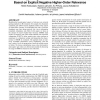Free Online Productivity Tools
i2Speak
i2Symbol
i2OCR
iTex2Img
iWeb2Print
iWeb2Shot
i2Type
iPdf2Split
iPdf2Merge
i2Bopomofo
i2Arabic
i2Style
i2Image
i2PDF
iLatex2Rtf
Sci2ools
97
Voted
SIGIR
2008
ACM
2008
ACM
Intuition-supporting visualization of user's performance based on explicit negative higher-order relevance
Modeling the beyond-topical aspects of relevance are currently gaining popularity in IR evaluation. For example, the discounted cumulated gain (DCG) measure implicitly models some aspects of higher-order relevance via diminishing the value of relevant documents seen later during retrieval (e.g., due to information cumulated, redundancy, and effort). In this paper, we focus on the concept of negative higher-order relevance (NHOR) made explicit via negative gain values in IR evaluation. We extend the computation of DCG to allow negative gain values, perform an experiment in a laboratory setting, and demonstrate the characteristics of NHOR in evaluation. The approach leads to intuitively reasonable performance curves emphasizing, from the user's point of view, the progression of retrieval towards success or failure. We discuss normalization issues when both positive and negative gain values are allowed and conclude by discussing the usage of NHOR to characterize test collections. Ca...
Beyond-topical Aspects | Information Technology | IR Evaluation | Negative Gain Values | SIGIR 2008 |
| Added | 15 Dec 2010 |
| Updated | 15 Dec 2010 |
| Type | Journal |
| Year | 2008 |
| Where | SIGIR |
| Authors | Heikki Keskustalo, Kalervo Järvelin, Ari Pirkola, Jaana Kekäläinen |
Comments (0)

